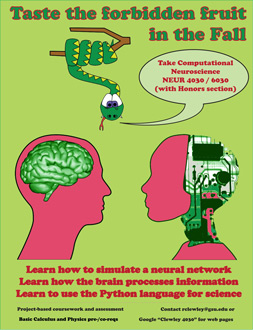Teaching
Computational Neuroscience - NEUR 4030/6030 (new in Fall 2012)

This is a project-based class using Python and Georgia State University's Virtual Computing Lab (VCL). There is an Honors section available.
The class considers big questions about brain simulation and information processing while developing your skills in scientific computing and mathematical modeling. The class gives maximal exposure to model building and hypothesis testing, but does not require much prior knowledge of biology, computing or mathematics.
Each student will keep an electronic laboratory journal of simulation results, describing the scientific question, the model used, the specific simulations, including all parameter values, the results, analysis and interpretation. This course gives a broad introduction to major topics in the modeling of cellular (single cells and ion channels) and systems (small and large network) in neuroscience, through the use of graphical methods and computational tools (PyDSTool). Students will discover the integral role of this field in both experimental and theoretical neuroscience. Grades will be based on project work, quizzes, and in-class presentations. See the syllabus for details, and contact me if you would like to seek an override for NEUR 3000 or Physics II (e.g. because you are taking it as a co-requisite in the Fall, or you've taken a comparable introductory course such as BIOL 4102).
Introduction to Modeling - NEUR 8790 (Fall 2011 and Fall 2013)
This Topics In Neuroscience graduate class is not a remedial math class for bioscientists. It is intended to lower the barrier for bio-science students to effectively communicate with mathematically-oriented researchers in the field. The course is based on discussions around journal articles and book chapters on "big picture" topics such as small world networks, evolutionary stable strategies, pattern formation, and others.
Calculus I - MATH 2211
I received GSU STEM Faculty Fellowship awards in the Summers of 2009 and 2010 to develop materials for a more science-focused version of the standard Calculus I class that we offer. This class is expected to be offered specially for science majors in Fall 2012.
Development of the calculus curriculum has continued with a 2011 Research Initiation Grant with Drs. Iman Chahine of the College of Education, and Dr. Mark Grinshpon in the department of Math and Stats.
Numerical analysis I - MATH 4610/6610
Fall 2009. Details on this course can be found here.
A useful tool in learning the underlying principles of computer arithmetic is this python module, which simulates binary floating point representation to IEEE 754 standards of arbitrary fixed precision, or to infinite precision.
New course offering, Fall 2012: Computational Neuroscience 4030/6030 (with Honors section)
